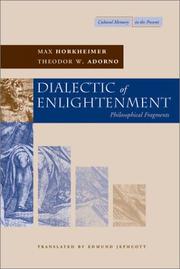| Listing 1 - 2 of 2 |
Sort by
|

ISBN: 080478809X 9780804788090 9780804736336 9780804736329 0804736324 0804736332 9781784786809 1784786802 Year: 2002 Publisher: Stanford, California
Abstract | Keywords | Export | Availability | Bookmark
 Loading...
Loading...Choose an application
- Reference Manager
- EndNote
- RefWorks (Direct export to RefWorks)
Dialectic of Enlightenment is undoubtedly the most influential publication of the Frankfurt School of Critical Theory. Written during the Second World War and circulated privately, it appeared in a printed edition in Amsterdam in 1947. "What we had set out to do," the authors write in the Preface, "was nothing less than to explain why humanity, instead of entering a truly human state, is sinking into a new kind of barbarism." Yet the work goes far beyond a mere critique of contemporary events. Historically remote developments, indeed, the birth of Western history and of subjectivity itself out of the struggle against natural forces, as represented in myths, are connected in a wide arch to the most threatening experiences of the present. The book consists in five chapters, at first glance unconnected, together with a number of shorter notes. The various analyses concern such phenomena as the detachment of science from practical life, formalized morality, the manipulative nature of entertainment culture, and a paranoid behavioral structure, expressed in aggressive anti-Semitism, that marks the limits of enlightenment. The authors perceive a common element in these phenomena, the tendency toward self-destruction of the guiding criteria inherent in enlightenment thought from the beginning. Using historical analyses to elucidate the present, they show, against the background of a prehistory of subjectivity, why the National Socialist terror was not an aberration of modern history but was rooted deeply in the fundamental characteristics of Western civilization. Adorno and Horkheimer see the self-destruction of Western reason as grounded in a historical and fateful dialectic between the domination of external nature and society. They trace enlightenment, which split these spheres apart, back to its mythical roots. Enlightenment and myth, therefore, are not irreconcilable opposites, but dialectically mediated qualities of both real and intellectual life. "Myth is already enlightenment, and enlightenment reverts to mythology." This paradox is the fundamental thesis of the book. This new translation, based on the text in the complete edition of the works of Max Horkheimer, contains textual variants, commentary upon them, and an editorial discussion of the position of this work in the development of Critical Theory.
Philosophy. --- Mental philosophy --- Humanities --- Philosophy
Book
ISBN: 0262275694 Year: 1995 Publisher: Cambridge : MIT Press,
Abstract | Keywords | Export | Availability | Bookmark
 Loading...
Loading...Choose an application
- Reference Manager
- EndNote
- RefWorks (Direct export to RefWorks)
These essays reveal another side of Horkheimer, focusing on his remarkable contributions to critical theory in the 1930s. Max Horkheimer is well known as the director of the Frankfurt Institute for Social Research and as a sometime collaborator with Theodor Adorno, especially on their classic Dialectic of Enlightenment. These essays reveal another side of Horkheimer, focusing on his remarkable contributions to critical theory in the 1930s. Included are Horkheimer's inaugural address as director of the Institute, in which he outlines the interdisciplinary research program that would dominate the initial phase of the Frankfurt School, his first full monograph, and a number of other pieces published in the 1930s. The essays, most of which have not appeared in English before, are surprisingly relevant to current post-philosophy debates, notably "On the Problem of Truth," with its focus on pragmatism, and "The Rationalism Debate in Current Philosophy," a sustained critique of the post-Cartesian philosophy of consciousness. Horkheimer's 1933 critique of Kantian ethics, "Materialism and Morality," is of particular interest given the current reaction to the neo-Kantian aspect of Habermas's work. There are also essays relevant to the current foundations debate within Continental philosophy, and the rationality/relativism question is sustained throughout the volume.
| Listing 1 - 2 of 2 |
Sort by
|

 Search
Search Feedback
Feedback About UniCat
About UniCat  Help
Help News
News